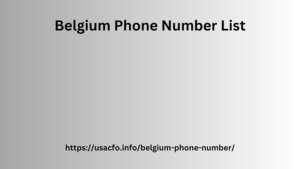本帖最后由 Mohammad22 于 2024-9-3 13:01 编辑
In today's digital age, phone numbers are more than just a means of communication; they are vital components of identity, privacy, and business operations. Understanding the legal aspects surrounding phone numbers is essential for individuals and businesses alike. This article explores the various legal considerations Belgium Phone Number List related to phone numbers, including ownership, privacy laws, telemarketing regulations, and more. Table of Contents- Introduction
- Ownership of Phone Numbers
- 2.1 Types of Phone Numbers
- 2.2 Transfer and Portability
- Privacy Laws and Phone Numbers
- 3.1 Personal Data Protection
- 3.2 Data Breaches and Liability
- Telemarketing Regulations
- 4.1 Do Not Call Registry
- 4.2 Consent and Opt-In Requirements
- Fraud and Scams Involving Phone Number

- 5.1 Spoofing and Caller ID Fraud
- 5.2 Reporting and Legal Recourse
- Conclusion
IntroductionThe legal landscape surrounding phone numbers is complex and multifaceted. As communication technology evolves, so do the laws that govern the use, ownership, and protection of phone numbers. This article provides a comprehensive overview of the legal aspects of phone numbers, helping readers understand their rights and obligations in this area. Ownership of Phone Numbers2.1 Types of Phone NumbersPhone numbers can be categorized into several types, each with its own legal implications: Landline Numbers: Typically associated with a physical address and owned by individuals or businesses. These numbers are regulated by telecommunications laws. Mobile Numbers: Usually assigned to portable devices and may be subject to different regulations, especially regarding portability and ownership. Toll-Free Numbers: These numbers are not charged to the caller but are billed to the business. Ownership of toll-free numbers can involve contractual agreements with telecommunications providers. Virtual Numbers: Often used for business purposes, virtual numbers can be redirected to various devices and may have different ownership rules.
2.2 Transfer and PortabilityPhone number portability allows individuals and businesses to retain their phone numbers when switching service providers. This process is governed by regulations that ensure a smooth transition, protecting consumers from losing their established contact numbers. Key points include: Regulatory Framework: In many regions, laws require telecom companies to facilitate number portability within a specific timeframe. Consumer Rights: Consumers have the right to request portability, and providers must comply without undue delays or fees. Challenges: Issues may arise during the transfer process, including disputes over ownership and service interruptions.
[/url]
[url=https://usacfo.info/belgium-phone-number/]

Privacy Laws and Phone Numbers3.1 Personal Data ProtectionPhone numbers are considered personal data under various privacy laws, which means they are subject to strict regulations regarding collection, storage, and use. Notable laws include: General Data Protection Regulation (GDPR): In the EU, GDPR mandates that organizations collect only necessary data and obtain explicit consent from individuals before processing their personal information. California Consumer Privacy Act (CCPA): This law gives California residents rights over their personal information, including the right to know how their phone numbers are used.
3.2 Data Breaches and LiabilityIn the event of a data breach involving phone numbers, organizations may face significant legal consequences. Key considerations include: Notification Requirements: Many jurisdictions require organizations to notify affected individuals promptly if their personal data is compromised. Liability: Organizations may be held liable for damages resulting from a data breach, especially if they failed to implement adequate security measures.
Telemarketing Regulations4.1 Do Not Call RegistryThe Do Not Call Registry is a key component of telemarketing regulations. It allows individuals to opt-out of unsolicited marketing calls. Important points include: Registration: Individuals can register their phone numbers to reduce unwanted calls, and telemarketers are legally obliged to respect these registrations. Enforcement: Violating the Do Not Call rules can result in significant penalties for telemarketers.
4.2 Consent and Opt-In RequirementsTelemarketing laws often require businesses to obtain explicit consent from individuals before contacting them. This includes: Written Consent: Many jurisdictions require written consent, particularly for automated calls or texts. Opt-Out Mechanisms: Businesses must provide easy ways for individuals to opt-out of future communications.
Fraud and Scams Involving Phone Numbers5.1 Spoofing and Caller ID FraudSpoofing involves falsifying the information transmitted to a caller ID display, making it appear as though the call is coming from a legitimate source. Legal aspects include: Criminal Penalties: Many jurisdictions have enacted laws prohibiting spoofing, and violators can face criminal charges. Consumer Protection: Victims of spoofing can report incidents to authorities and may have avenues for recourse.
5.2 Reporting and Legal RecourseIndividuals who fall victim to phone scams can take several steps: Reporting: Victims should report scams to local law enforcement and consumer protection agencies. Legal Action: Depending on the circumstances, individuals may seek legal action against scammers, although recovery can be challenging.
ConclusionUnderstanding the legal aspects of phone numbers is crucial for both consumers and businesses. As technology continues to evolve, so too will the laws governing phone numbers. By staying informed about ownership rights, privacy protections, telemarketing regulations, and the risks of fraud, individuals and organizations can navigate this complex landscape more effectively. This knowledge not only protects personal information but also fosters a safer communication environment for everyone. |